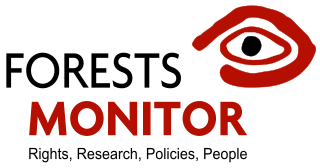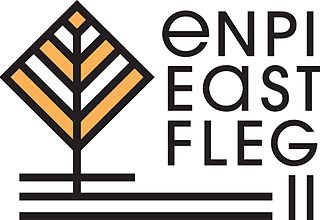
The economy of the Democratic Republic of the Congo has declined drastically around the 1980s, despite being home to vast potential in natural resources and mineral wealth; their gross domestic product is $48.994 billion as of 2019.

The Democratic Republic of the Congo (DRC), also known as Congo-Kinshasa and formerly known as Zaire, is a country in Central Africa bordered to the west by the South Atlantic Ocean. By land area, the DRC is the second-largest country in Africa and the 11th-largest in the world. With a population of around 112 million, the Democratic Republic of the Congo is the most populous officially Francophone country in the world. The national capital and largest city is Kinshasa, which is also the nation's economic center. The country is bordered by the Republic of the Congo, Central African Republic, South Sudan, Uganda, Rwanda, Burundi, Tanzania, Zambia, Angola, and the Cabinda exclave of Angola.

Illegal logging is the harvest, transportation, purchase, or sale of timber in violation of laws. The harvesting procedure itself may be illegal, including using corrupt means to gain access to forests; extraction without permission, or from a protected area; the cutting down of protected species; or the extraction of timber in excess of agreed limits. Illegal logging is a driving force for a number of environmental issues such as deforestation, soil erosion and biodiversity loss which can drive larger-scale environmental crises such as climate change and other forms of environmental degradation.

Virunga National Park is a national park in the Albertine Rift Valley in the eastern part of the Democratic Republic of the Congo. It was created in 1925. In elevation, it ranges from 680 m (2,230 ft) in the Semliki River valley to 5,109 m (16,762 ft) in the Rwenzori Mountains. From north to south it extends approximately 300 km (190 mi), largely along the international borders with Uganda and Rwanda in the east. It covers an area of 8,090 km2 (3,120 sq mi).
Mbuyamu Ilankir "Freddy" Matungulu (born January 4, 1955 Belgian Congo is a Congolese economist. He was Minister of Finance of the Democratic Republic of the Congo from 2001 to 2003.
Independent forest monitoring (IFM) is a tool for assessing and strengthening legal compliance in the forest sector internationally. By complementing official forest law enforcement activities with the objectivity and public credibility of an independent third party, IFM can improve transparency in the short term while contributing to the development of a sound legislative and regulatory framework for responsible forest management.

The mining industry of the Democratic Republic of the Congo produces copper, diamonds, tantalum, tin, gold, and more than 63% of global cobalt production. Minerals and petroleum are central to the DRC's economy, making up more than 95% of value of its exports.

Forests Monitor is a non-governmental organization that was established in Cambridge, England, in 1993, to support forest-dependent people and raise public awareness about the negative impact that industrial forest exploitation has on the people that live in these forests and on the ecosystems that support them, including the wide range of plants and animals. Their aim is to provide detailed research on forestry companies and their activities to NGOs and interested citizen's groups, and so support and empower those people affected by bad practices. Forests Monitor is a non-profit, non-governmental organisation.

Law enforcement in the Democratic Republic of the Congo has historically been focused on furthering the state's aims with no regard for human rights. The Police nationale congolaise is the police throughout the territory of the Democratic Republic of the Congo. It was composed of between 110,000 – 150,000 officers as of 2010.

The Agreement on the Conservation of Gorillas and Their Habitats, also known as the Gorilla Agreement, is a multilateral environmental agreement that binds the parties to conserve gorillas in their territories. It was concluded 2007 under the auspices of the Convention on Migratory Species of Wild Animals (CMS), also known as the "Bonn Convention", with scientific support from the Royal Belgian Institute for Natural Sciences and GRASP. The Gorilla Agreement covers 10 range states and entered into force in June 2008.
The Rainforest Foundation UK (RFUK) is a non-profit NGO working in Africa and South America. It is one of the first international organizations to support the indigenous peoples of the world's rainforests in their efforts to protect their environment and fulfill their rights to land, life and livelihood. The Foundation aims to protect rainforests by securing the land rights of indigenous peoples and other forest-dependent communities. It also campaigns internationally on issues such as industrial logging, climate change, agricultural expansion and nature conservation.
The Central African Forest Commission is an intergovernmental organisation in Central Africa. Its goal is to manage the forests of Central Africa in a sustainable manner and is supported by the wildlife trade monitoring network TRAFFIC The secretariat is based in Yaoundé, Cameroon. Raymond Mbitikon serves as its Executive Secretary.
The Congo Basin Forest Partnership (CBFP) is a non-profit initiative to promote the conservation and responsible management of the Congo Basin's tropical forests. The project aims to improve the techniques and information sharing of involved organizations. It is led by the United States and sponsored by more than 40 international governments and investors.

Deforestation in the Democratic Republic of the Congo (DRC) is an environmental conflict of international importance. Most of the deforestation takes place in the Congo Basin, which holds the second largest rainforest of the world after the Amazon. Roughly fifty percent of the remaining rainforest in the Congo Basin lies within the boundaries of the DRC.

Oil and gas dominate the extraction industries of the Republic of the Congo, also referred to as Congo-Brazzaville. The petroleum industry accounted for 89% of the country’s exports in 2010. Among African crude oil producers in 2010, The Congo ranked seventh. Nearly all of the country's hydrocarbons were produced off-shore. The minerals sector is administered by the Department of Mines and Geology. Presently no major mining activities are underway, although there are some small-scale domestic operations. However, the country does have numerous large-scale undeveloped resources. The country has recently attracted a strong influx of international companies seeking to tap into the vast mineral wealth.
In the Democratic Republic of the Congo there is a significant community of Chinese migrants located in the capital of Kinshasa and the mineral rich southern Haut-Katanga Province. According to official figures from the Chinese embassy, there are 5,000 Chinese living in the DR Congo, though the actual number is believed to be far higher. More recent estimates vary from 5,000 to 50,000. The Mining industry of the Democratic Republic of the Congo is a main reason for Chinese people moving to the DRC.
The European Union Forest Law Enforcement, Governance and Trade Action Plan is a European Union initiative to address illegal logging and the social, economic and environmental harm it causes. The EU adopted the Action Plan in 2003. The plan includes activities in the EU and in tropical countries that export timber and timber products to the EU. These measures include a regulation that prohibits EU businesses from importing or trading illegal timber, and bilateral trade agreements with timber-exporting countries. Much of the FLEGT Action Plan focuses on promoting trade in legal timber products and creating disincentives for trade in illegal products. However, the Action Plan's measures go further by addressing aspects of poor governance that enable illegal logging to persist.

Although the Democratic Republic of the Congo (DRC) has Africa's largest freshwater resources, it is suffering from an acute drinking water supply crisis. The DRC has one of the lowest rates of access to clean drinking water in Sub-Saharan Africa and the world. Only 46 percent of the population had access to an improved drinking water source in 2012. Furthermore, the sanitation coverage was estimated at only 31 percent in 2012. Up to date and accurate information on water supply and sanitation services in the DRC is scarce. As a result of inadequate water supply and sanitation services, many inhabitants are suffering from waterborne diseases, including diarrhoea, typhoid, and cholera.

European Neighborhood and Partnership Instrument Forest Law Enforcement and Governance Program is a program that aims to improve forest law enforcement and governance in 7 countries: Armenia, Azerbaijan, Belarus, Georgia, Moldova, Russia, and Ukraine. It comprises two parts, FLEG I, implemented in 2008–12, and FLEG II, implemented in 2012–16. The program is implemented by the World Bank, IUCN, and WWF. The Program is mostly funded by European Commission through the European Neighbourhood and Partnership Instrument; some activities are funded by the Austrian Development Cooperation. The program has been developed in response to the growing problem of illegal forest activities in the participating countries. The Program aims to:
Noël Kabamba Tshiani Muadiamvita is a Congolese economist and politician who was a candidate for president during the 2018 general election.












